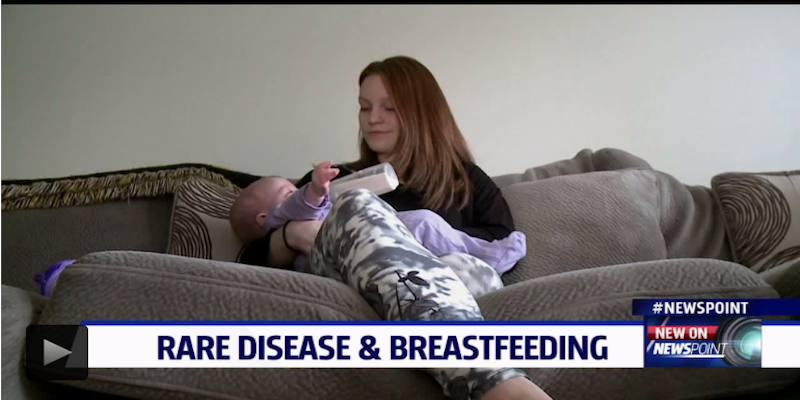- Study Says Most Parents Don’t Use Car Seats In Ride Share Vehicles Like Uber
- This 12-Year-Old Boy Is A Sophomore Aerospace Engineering Major!
- Fire Safety Experts Warn Of Hand Sanitizer Danger After A Mom and Kids Escape House Fire
- Recall Alert: Peaches May Be The Cause Of Salmonella Outbreak, 68 People Ill
- Summer Vacation In The Days Of COVID: Tips To Stay Safe
- How To Safely Grocery Shop During The Coronavirus Pandemic
- Michigan Teen With Vape-Related Illness Undergoes Double Lung Transplant
- Teen Kicks Off Anti-Vaping Campaign From Hospital Bed
- Teenager Receives Life Sentence For Strangling Sister To Death Over A Wi-Fi Password
- Toddler Falls To Death From 11th Deck of Cruise Ship
Mom Warns Parents To Go For Crucial Screening To Detect Rare Disease


Heard of Galactosemia? It’s a rare disease which impacts infants – and breast milk or cows milk can be deadly for children with this condition.
Alyssa Tagua and her husband have 2 daughters with this hereditary disease. After a few days of breastfeeding, her baby stopped eating. Her first born daughter Brooklyn had galactosemia. Which is a genetic disorder in which the body lacks an enzyme that focuses on how the body breaks down dairy products.
Community Health Network Pediatrician, Dr. Israa Khan said.”As soon as milk is introduced into their diet which is the source of galactose so whether it be human milk, whether it be cows milk that rapidly increases the galactose level in their blood because they don’t have the enzyme to break it down,”
Although both girls have the hereditary disease, 6-month-old Ava has a more severe case.
“If you were to give her a candy bar and she ate it she would be dead within 3 days. Because her body cannot process any of it whatsoever,” mom Alyssa said.
Symptoms of the decease include liver failure and developmental delays and if it’s not caught within the first 2 weeks of life it could be deadly, so a newborn screening is the first line of defense to catch galactosemia.
“I thought it was just a useless screening it was just another test they wanted to do…Prick her and hurt her and had I not gotten it she would not be here,” Alyssa said.
It’s, in fact, a life-long illness which involves a strict dairy free diet which meant Alyssa had to forget about her goal to exclusively breastfeed.
“Every time we encourage breast milk which definitely we say is the best we forget at times that there are conditions there are certain babies who are born with a condition where it just cannot be done,” Dr. Khan said.
Alyssa wants to now share her important knowledge with other parents.
“So don’t make assumptions that it’s nothing. If your motherly instinct is kicking in do something and take action before it is too late,” Alyssa said.
This disease is extremely rare and impacts about 1 in every 60,000 newborns. The screenings are offered as soon as the child is born and most babies with the disease are moved to a soy based formula.








0 comments